

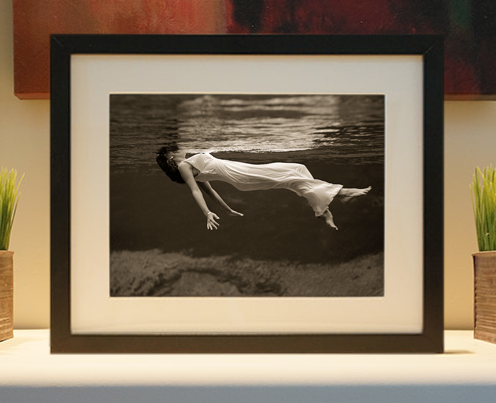
Framed or unframed, desk size to sofa size, printed by us in Arizona and Alabama since 2007. Explore now.
Shorpy is funded by you. Patreon contributors get an ad-free experience.
Learn more.

- Lofty addition
- In 1912
- Keenan Building
- Six years old
- Taken from the P.J. McArdle Roadway?
- It stood only 47 years
- Three track mind
- Incline to the right
- Reach for the sky, 1912 style
- No clean sweep
- Same Job Title, Same Face
- Sadly Lost
- Beautiful ...
- Where you get your kicks
- Aim High
- Pueblo Revival sisters
- Pueblo Neoclassicism
- Milk Man
- Regional dialect.
- Spielberg's inspiration
- Great Photo
- Loaf Story
- Do you still have the Rakes category?
- Could almost be a scene from the 1957 movie 'Hell Drivers'
- The Wages of Fear.
- Conspicuous by their absence
- Got Milk?
- All that aluminum
- No lefties
- Smoke 'em if you've got 'em
Print Emporium
Multipurpose Room: 1940
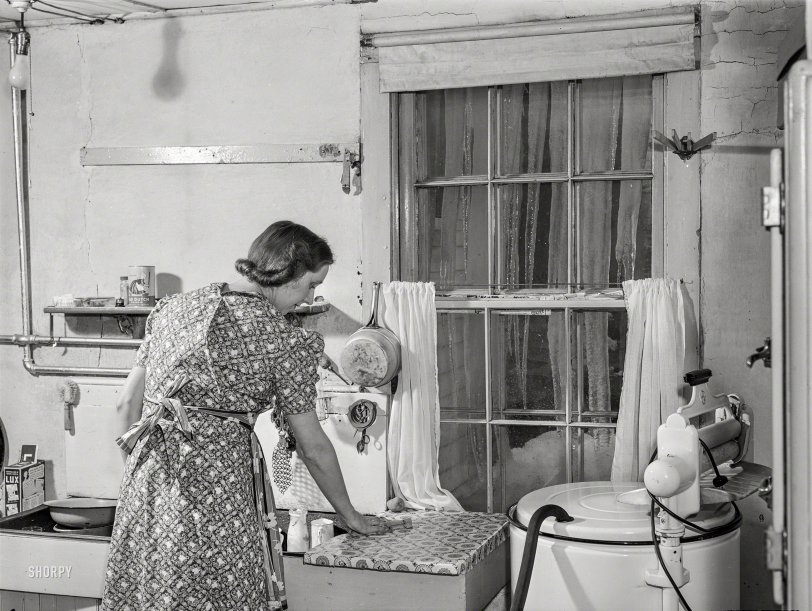
March 1940. "New England housewife fixing supper on a winter night. Woodstock, Vermont." Photo by Marion Post Wolcott for the Farm Security Administration. View full size.
Ice
I notice a familiar piece of kitchen equipment right by the saucepan hanging over the sink: an ice pick! Obviously, this house has an icebox.
I recall one could buy a 25- or 50-pound block. A card was left in a window where the iceman could see it from his horse drawn cart. One side of the card had a large 25 with a large 50 on the other side which indicated how much ice the household required. It all hinged on how much room there was still remaining in the ice storage compartment atop the icebox after the old ice had melted down.
The water from the melting ice was collected in a metal pan placed under the icebox. Invariably, the person charged with dumping that pan would forget to do so until the pan was running over onto the kitchen floor. These blasted collection pans were usually too shallow. When brimming over, it would be virtually impossible to get it to the kitchen sink to dump it without a massive spill.
I can recall my mother screaming at me for allowing it to get to this point.
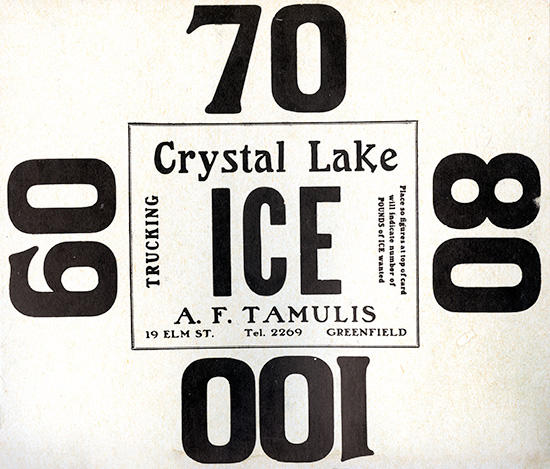
Oh Those Icicles
If a boy isn't careful they could shoot his eye off.
Re: consider moving
Ever since I insulated my Quebec attic I don’t have icicles like that anymore (although my hot-roof neighbors do!), but I still have to caulk my 120-year-old windows with weather-stripping to keep out the chilly drafts in wintertime. Would I ever “consider moving to a more moderate clime”? And forgo the bracing cold, the abundant snow, the brilliant blue skies, the northern winds? Never!
Icicles on the eaves
When heat was cheap and attic insulation was unheard of.
Whoa, Nelly
When icicles as big around as your arm have formed a curtain outside your window, and you can't stuff enough newspaper into the cracks, it's time to consider moving to a more moderate clime. The last time I saw something like this was when I visited relatives in Quebec one Christmas. No thanks; it's the sunny South for me.
Watch Out
For those icicles, they can kill you. I remember icicles like this on our old house in Boston in the 1960's. With new building and re-roofing techniques that properly keep most of the heat out of the attic spaces, and ventilating in the attic, I don't see much like these anymore.
Missing the forest for the icicles
Double windows with newspaper still stuck into the gap between upper and lower sashes to insulate from drafts.
And the huge icicles draping down outside the window no doubt due to the lack of insulation above the very warm kitchen resulting in melting roof snow refreezing as the water dripped down the edge of the roof.
No ground
On that light fixture. Thus, it's possible for the pull chain to be at line voltage, which could happen if a loose strand of wire contacted the metal shell of the lamp socket, for example.
The string attached to the pull chain is a (poor) attempt to avoid an accident - the string (when dry) doesn't conduct, so you could turn the light on and off without risk of shock.
Nowadays we have GFI protection for circuits within reach of water.
Churchkey!
I wonder how many millennials and later have any idea what rubber sealing rings are used for and, for that matter, what a churchkey is. Under the rings is a claw-shaped can opener — I doubt most people today know how to use one, unless they used a P38 with their military rations. I even see a light socket to outlet adapter, and remember my grandmother using one from the hanging braided light cord in the kitchen to plug in her newfangled electric iron!
Icicles
Those are some serious roof-to-ground icicles outside her window.
Thrifty Housewife
How she is fixing supper with just that one potato, I know not. Hopefully, it does not involve a mix of Lux Flakes and Old Dutch.
Despite the vintage caption, it appears that the tired looking lady is cleaning the dishes and wiping the counters, probably after dinner.
Icicles
Considering the size of those icicles, one must conclude that every single calorie of heat generated in this house passes right out the roof!
"Resistance" is futile ...
Lady of the rings
Her Chain Mail Scrubber (hanging at the top of the sink) is still available to scrub your cast iron pans.
Pipe Fittings
I have never seen the type of pipe coupler fitting used here. It has a bend in it to allow for another pipe to pass under it.







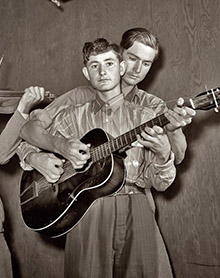

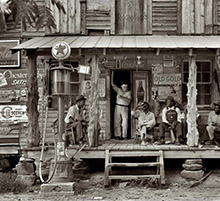
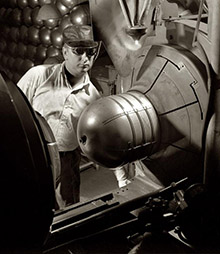
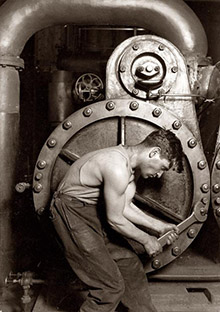

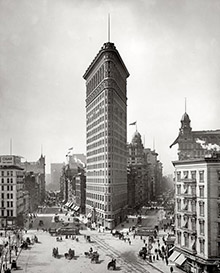










On Shorpy:
Today’s Top 5